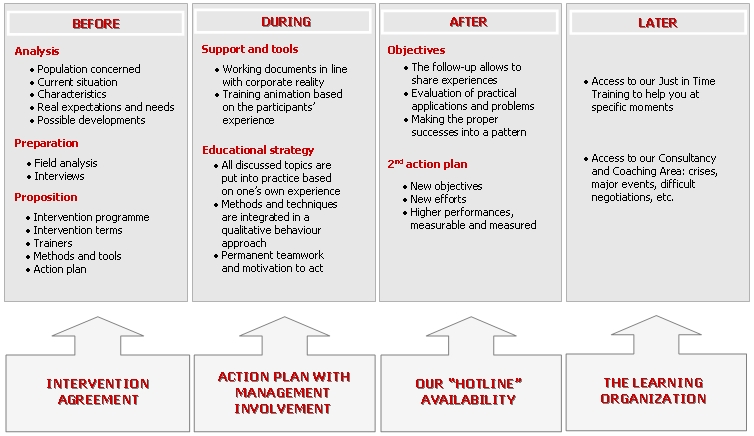





Our trainings
“To train or not to train: that is the question”…
What if you train them and they leave?
What if you don’t train them and they stay…
Investing in permanent training for all your staff members is a decisive strategic tool for the durability and the development of your company.
Progress as partner
We create a favourable climate for acquiring new competencies. Our trainings are based on very concrete situations and stimulate the attendee’s active participation.
Based on a preliminary review of the needs, a tailor-made programme and follow-up are proposed. This approach allows analysing the difficulties we have encountered when implementing the action plan that is defined during the training.
Besides the conventional means (self-diagnosis, case studies and practical exercises, often video-taped, analysed and commented) we particularly rely on an approach aimed at teaching participants to become accountable with regard to the changes in their daily behaviour.
Our methods
Themes discussed in training
Bear the crisis and take advantage of it…
Our methods
Our methods guarantee you will continuously obtain instant and strong results to which we are geared at any time.
Our relational approach is continuous, as we invest all the time that is necessary to get to know our partner clients as well as possible.
Below you’ll find a description of the several stages of our intervention:

Setting up a “consultancy hotline” is included in our fee. Together with our clients we determine how long this hotline will be operational (3 months, 6 months, etc.).
Themes discussed in training
In order to obtain efficiency, each theme has its own basic items and compulsory activities. Based on this primary fact we work out a tailor-made solution that is geared to the expectations and needs of the company’s staff members.
 |
 |
 |
 |
 |
| Management | Communication | Self-development |
Commercial activities | Client relation |
Management
The manager as supplier of "management services".
During his career, the manager should empathise with his staff members, motivate them, listen to them, and behave assertively. If that is not the case, then can we see him as a “manager”?
Management trainings
- The progress manager: the strategy to evolve from basic towards experienced.
- Leadership: reinforcing charisma and the path to authenticity.
- The participative manager: harmoniously managing and developing the talents of your staff, as they are the real driving forces behind the team and the company.
- The manager as coach: how to consciously manage your staff members and their skills.
- The manager and assertiveness: how to reach your objectives, and at the same time maintaining a positive relationship with your staff members, at all times.
- Having an evaluation talk: how to manage this major yearly moment of motivation for your staff member.
- The change manager: creating an acceptable change philosophy that is accepted and defended by everyone.
- Working together: building and maintaining relationships in order to have everyone working together efficiently, an absolute condition for corporate success!
Communication
Communicating is sharing.
Sharing and mainly making accessible, making all your messages more comprehensible… in order to get into contact with your colleagues, your clients, your staff members, to convince them, to negotiate and to collaborate in an efficient way.
Communication trainings
- Speaking in public: communicating is knowing how to express oneself vigorously and with conviction in the other’s “landscape”.
- The quality relationship with the client: how to live in harmony with our principal business providers.
- Building an internal communication: setting up and simplifying the exchange structure of our professional universe.
- Implementing a training strategy: what can really help us in terms of gearing to our needs.
- Communication beyond words: learning and understanding the major element of our messages, the non-verbal aspect.
- Crisis management: preparing oneself for the worst (and being ready) in order to avoid the disastrous and terrifying aspects that can lead to loss of image and means.
- Making meetings profitable: the moments when efficiency is won or lost…
Self-development
Individual development for the benefit of the group.
How can we relate well to the others if we feel bad ourselves?
Getting to know oneself better and increasing one’s self-control… a vast programme that takes more than one day! So we’d better start immediately…
Self-development trainings
- Assertiveness: saying what you think, thinking of what you say, in mutual respect and within the framework of a win/win relationship.
- Managing difficult people: dealing with roughnecks, manipulators, saboteurs, pests, negativists, etc. without too much hassle and reducing the excessive pressure they generate.
- Stress management: learning how to relax, to know oneself, to manage tensions, and to know how to calm down correctly.
- Managing constant change: experiencing permanent adjustments as natural and indispensable.
- Managing the pressure in an interview: serenely defending one’s point of view when facing pressure, and at the same time increasing one’s confidence and self-control.
- Knowing how to organise quickly and effectively: clearly defining our priorities, have them respected, developing our methods and means so we can use them efficiently and make good use of our time!
Commercial activities
Developing and committing your client portfolio thanks to a motivated, dynamic and well-performing sales team.
In difficult times it’s the commercial team that determines whether or not a company survives.
So every staff member of the company has to develop this aspect on a daily basis.
Why not making it a habit?
Commercial trainings
- Sales Basics: teaching every sales person the basics and refer to it daily.
- Tailor-made sales: creating a sales approach that is adapted to each client’s profile.
- Reflex sales: defining the areas in which you can reinforce your general dealings through automatic sales.
- Negotiation: implementing a solid negotiation model that is geared to your and to the corporate values.
- From technical to commercial: teaching the technician how to think commercially in order to bring his performances in line with his know-how
Client relation
Being customer-oriented is more than a state of mind, it’s a corporate culture!
There are no universal rules to model the client-supplier relationship.
Each organisation has its own specific recipe to get there. Originality and rigour are the ingredients that allow a company to define and derive “its” added value on a daily basis.
Client relation trainings
- Quality customer service: a constant quality relationship with all staff members will allow the company to bind its clients.
- Complaint management: maintaining our clients’ confidence by correctly processing their requests. A challenge that is sometimes difficult, but imperative to succeed!
- Making the corporate reception profitable: welcome all your clients, both big and small, in the same qualitative way. As such you get the company a dynamic and powerful image, and you’ll make sure that your clients will be happy to come back!
- Internal client-supplier: within the company, we are all clients and suppliers for each other. The quality of our relationship with our internal clients determines the excellence of our service to our external clients.
- Debt collection by phone: organising and modelling an efficient approach, allowing us to maintain and valorise our commercial relations.
Bear the crisis and take advantage of it…
When one speaks of crisis, the first word that should come to mind is “opportunity”.
The opportunity to challenge oneself, to show oneself as creative and innovative, daring to “leave the straitjacket” and take on new challenges.
We show you how to take advantage of this turbulent period and adapt (or revise) your competencies in three main fields
Increase your commercial professionalism
Lessen the tensions that affect our well-being and decrease our performances
The manager in times of crisis
Increase your commercial professionalism
Increasing sales thanks to a better understanding of our clients, and reducing any problems to get into contact with them. Making sure unpaid invoices are paid. Negotiating more efficiently. Improving the commercial talents of each staff member through frequent training.
Lessen the tensions that affect our well-being and decrease our performances
Anticipate tensions. Manage difficult people more quickly. Decrease our losses in time and means by making good use of every relational investment.
The manager in times of crisis
Manage your work staff under pressure and channel their energy into a bigger collective intelligence. Stimulate their willingness to work in a team. Develop the necessary input of information that is potentially present in each staff member.
You want to know more? Contact us !
Copyright 2009 - www.progress-management.com